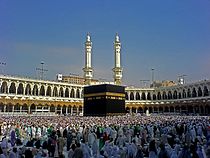Eid ul-Fitr is observed over a three-day public holiday in Bangladesh. Educational institutions, banks and corporate offices usually remain closed for a week during this time. Bangladeshi observe the holiday by performing the obligatory Eid prayers on the morning of Eid, giving Zakat ul Fitr, and visiting friends and relatives. Popular customs also include ladies decorating one's hands with henna, dressing up in new clothes and having a good meal with family and friends.
All Muslims dress in the clothing(Panjabee, Pazama and other dress) and children also dressed with the colorful clothing and received gifts from their seniors on this day.
Eid-ul-Fitr is the first day of the Islamic month of Shawwal. It marks the end of Ramadan, which is a month of fasting and prayer. Many Muslims attend communal prayers, listen to a Khutba (sermon) and give zakat al-fitre (charity in the form of food) during Eid ul-Fitr.
Many Muslims attend communal prayers and listen to a Khutba or sermon on the first day of the month of Shawwal. These prayers are held outside or in large venues, such as ‘Eidgha’ Mosque and others open fields. Many Muslims may travel far to participate in these activities. Some communities organize different festivities, such as communal meals or events for children, on this day.
If a Muslim has not given zakat al-fitr during Ramadan, he or she can give this on Eid-al-Fitr. Zakat al-fitr is a form of charity consisting of a quantity of food, such as barley, dates, raisins or wheat flour, or its monetary equivalent given to the poor. Many Muslims may also prepare festive meals to share, wear new clothes, visit relatives and give presents or candy to children. Cards can also be sent, often featuring the words “Eid Mubbarak” (blessed Eid).
All Muslims dress in the clothing(Panjabee, Pazama and other dress) and children also dressed with the colorful clothing and received gifts from their seniors on this day.
Eid-ul-Fitr is the first day of the Islamic month of Shawwal. It marks the end of Ramadan, which is a month of fasting and prayer. Many Muslims attend communal prayers, listen to a Khutba (sermon) and give zakat al-fitre (charity in the form of food) during Eid ul-Fitr.
Many Muslims attend communal prayers and listen to a Khutba or sermon on the first day of the month of Shawwal. These prayers are held outside or in large venues, such as ‘Eidgha’ Mosque and others open fields. Many Muslims may travel far to participate in these activities. Some communities organize different festivities, such as communal meals or events for children, on this day.
If a Muslim has not given zakat al-fitr during Ramadan, he or she can give this on Eid-al-Fitr. Zakat al-fitr is a form of charity consisting of a quantity of food, such as barley, dates, raisins or wheat flour, or its monetary equivalent given to the poor. Many Muslims may also prepare festive meals to share, wear new clothes, visit relatives and give presents or candy to children. Cards can also be sent, often featuring the words “Eid Mubbarak” (blessed Eid).

Comments
Post a Comment